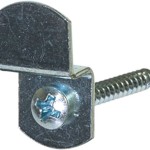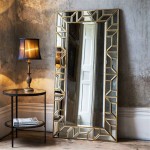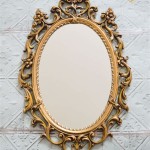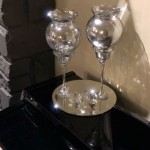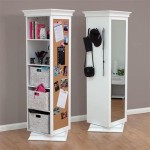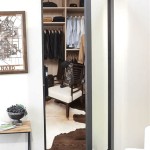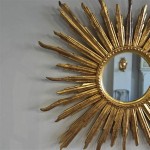How to Make a Mirror from Plain Glass
Creating a mirror from plain glass involves depositing a thin, reflective layer onto the glass surface. This process, known as silvering, utilizes chemical reactions to create a smooth, uniform coating of a reflective material, typically silver, though other metals like aluminum or gold can also be used. While commercially produced mirrors utilize specialized equipment and controlled environments, basic mirroring can be achieved with readily available materials and careful execution.
Safety precautions are paramount when undertaking this process. The chemicals involved are hazardous and require careful handling. Always wear appropriate personal protective equipment (PPE), including gloves, safety goggles, and a lab coat or apron. Work in a well-ventilated area to prevent the inhalation of fumes. Consult the safety data sheets (SDS) for each chemical before use and ensure proper disposal methods are followed.
Before the silvering process begins, the glass surface must be thoroughly cleaned. Any dirt, grease, or fingerprints will interfere with the uniform deposition of the reflective layer, resulting in imperfections in the finished mirror. Cleaning can be accomplished using a mixture of distilled water and a mild detergent, followed by rinsing with distilled water. A final cleaning with isopropyl alcohol will remove any remaining residues and ensure a pristine surface for the silvering process.
The silvering process relies on a chemical reaction that reduces silver ions in a solution to metallic silver, which then adheres to the glass surface. Several methods exist for accomplishing this, but one common approach utilizes silver nitrate as the source of silver ions and a reducing agent, such as dextrose or formaldehyde, to facilitate the reduction. Other chemicals, such as ammonia and potassium hydroxide, may be used to control the reaction rate and ensure a uniform coating.
A typical silvering solution is prepared by dissolving silver nitrate in distilled water. A separate solution containing the reducing agent is also prepared. The exact proportions of these solutions will vary depending on the specific recipe and the desired thickness of the reflective layer. It is crucial to follow a tested and reliable recipe to achieve optimal results. Resources such as scientific literature and reputable online sources can provide detailed instructions for preparing the silvering solutions.
Once the solutions are prepared, the cleaned glass is carefully placed in a container, ensuring it is fully submerged. The silver nitrate solution and the reducing agent solution are then combined, initiating the silvering reaction. This reaction must occur in a clean, non-reactive container, such as a glass or plastic dish. Avoid using metal containers, as they can interfere with the chemical reaction. The glass should remain undisturbed during the silvering process to allow for a smooth and even deposition of the silver layer.
The silvering process typically takes several minutes to complete, depending on the temperature and the specific chemical concentrations. As the reaction progresses, the glass surface will gradually become reflective. Once the desired level of reflectivity is achieved, the glass is carefully removed from the solution and rinsed thoroughly with distilled water to stop the reaction and remove any residual chemicals.
After rinsing, the newly silvered glass is allowed to dry completely. It is important to avoid touching the silvered surface during the drying process, as it can be easily damaged. Once dry, the silvered surface is typically coated with a protective layer to prevent oxidation and scratches. This can be achieved using a clear lacquer or a specialized protective coating designed for mirrors. Applying the protective coating is crucial for longevity and maintaining the reflectivity of the homemade mirror.
Different silvering methods offer variations in the chemical processes and resulting mirror quality. For example, some methods utilize a two-step process, where a sensitizing solution is applied to the glass before the silvering solution. This can improve the adhesion of the silver layer and result in a more durable mirror. Researching these different methods can provide insights into achieving specific desired outcomes in terms of reflectivity, durability, and overall mirror quality.
Achieving a flawless, professional-quality mirror through home methods can be challenging. Factors such as temperature, humidity, and the purity of the chemicals can all influence the final result. Imperfections, such as streaks or blotches, can occur if the silvering process is not executed precisely. Practice and careful attention to detail are key to improving the quality of the homemade mirror. Multiple attempts may be necessary to achieve desired results.
Beyond silver, other metals can be used to create mirrors with different reflective properties. Aluminum, for instance, is commonly used in telescope mirrors due to its high reflectivity in the ultraviolet and infrared spectrum. Gold, while less commonly used, produces mirrors with a distinctive warm hue. The process of depositing these metals onto glass generally involves similar principles of chemical reduction but requires different precursor solutions and reducing agents specific to the chosen metal.

How To Make A Mirror With Pictures Wikihow

Easy Ways To Make A One Sided Mirror With Pictures Wikihow

Window Pane Mirror With Faux Antique Mercury Glass

How To Turn Ordinary Glass Into An Antique Mirror

Diy Antiquated Mirror Antique Looking Glass Spray Paint

Easy Ways To Make A One Sided Mirror With Pictures Wikihow

Decorating I Decided To Make My Own Glass Tiled Bathroom Mirror When Couldn T Find One Liked For Less Than 100 Cut Home Diy Redo

Factory Bulk Offer Mirror Glass For Hotel Home Bathroom Make Up Decorative Ultra Clear China Made In Com

Silver Rectangular Elegant Stylish Hand Craved Plain Wall Mounted Glass Mirror At Best In Moradabad R T Handicrafts

4mm 5mm 6mm Wall Decor Round Rectangle Clear Beveled Frameless Furniture Mirror Basin Bath Bathroom Glass Make Up China Made In Com

